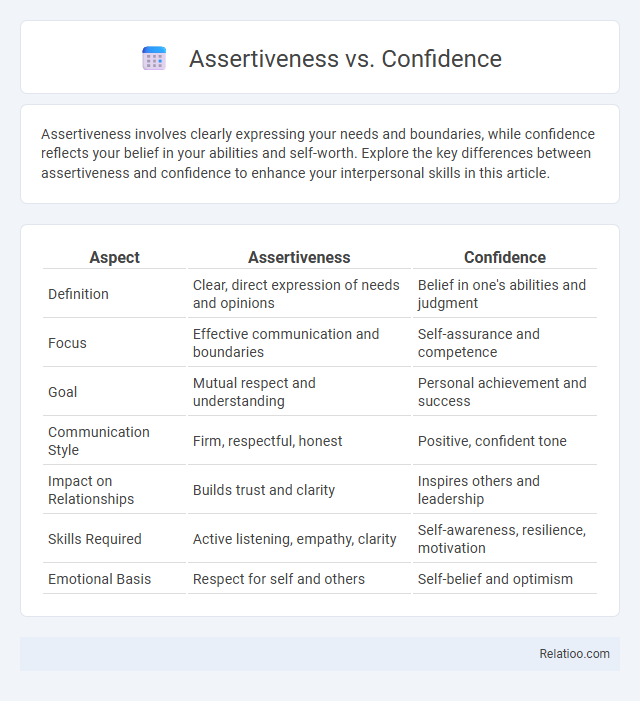Assertiveness involves clearly expressing your needs and boundaries, while confidence reflects your belief in your abilities and self-worth. Explore the key differences between assertiveness and confidence to enhance your interpersonal skills in this article.
Table of Comparison
| Aspect | Assertiveness | Confidence |
|---|---|---|
| Definition | Clear, direct expression of needs and opinions | Belief in one's abilities and judgment |
| Focus | Effective communication and boundaries | Self-assurance and competence |
| Goal | Mutual respect and understanding | Personal achievement and success |
| Communication Style | Firm, respectful, honest | Positive, confident tone |
| Impact on Relationships | Builds trust and clarity | Inspires others and leadership |
| Skills Required | Active listening, empathy, clarity | Self-awareness, resilience, motivation |
| Emotional Basis | Respect for self and others | Self-belief and optimism |
Understanding Assertiveness: Key Traits
Understanding assertiveness involves recognizing clear communication, respecting boundaries, and expressing your thoughts calmly and firmly. Unlike confidence, which is an internal belief in your abilities, assertiveness emphasizes balanced interactions where you stand up for yourself without aggression. Developing this skill improves your personal and professional relationships by fostering mutual respect and clarity.
Defining Confidence: Core Characteristics
Confidence is the belief in your abilities and judgment, characterized by self-assurance, positive self-perception, and the ability to take risks without excessive fear of failure. It involves a stable sense of self-worth and resilience, enabling you to face challenges with optimism and persistence. Unlike assertiveness, which is the communication of your needs and boundaries, confidence underpins how you perceive and project your value in various situations.
Assertiveness vs Confidence: The Crucial Differences
Assertiveness involves clearly expressing your thoughts and needs while respecting others, whereas confidence reflects your belief in your own abilities and judgment. You must recognize that assertiveness directly impacts communication effectiveness, while confidence influences self-perception and risk-taking behavior. Understanding the crucial differences between assertiveness and confidence helps improve interpersonal interactions and personal growth.
Why Assertiveness Matters in Communication
Assertiveness matters in communication because it allows individuals to express their thoughts and needs clearly while respecting others' boundaries, promoting mutual understanding and reducing conflicts. Unlike confidence, which is the belief in one's abilities, assertiveness involves direct and honest interaction that balances self-expression with empathy. Developing assertiveness enhances interpersonal relationships by fostering open dialogue and ensuring that personal rights are upheld without aggression or passivity.
The Role of Confidence in Personal Growth
Confidence serves as the foundation for assertiveness and plays a crucial role in personal growth by enabling individuals to express themselves clearly and stand up for their rights without aggression. Unlike assertiveness, which involves communication style and behavior, confidence reflects an internal belief in one's abilities and potential. Building confidence enhances decision-making skills, encourages risk-taking, and fosters resilience, all essential components for achieving personal development goals.
Signs You're Assertive but Not Confident (and Vice Versa)
Signs you're assertive but not confident include speaking up firmly yet doubting your decisions afterward, or setting clear boundaries without fully trusting your judgment. Conversely, confidence without assertiveness might show as feeling self-assured internally but hesitating to express your needs or opinions openly. Understanding your balance between assertiveness and confidence helps improve your communication and self-awareness for better personal and professional relationships.
Developing Assertiveness Without Aggression
Developing assertiveness without aggression involves expressing your thoughts and feelings clearly and respectfully, ensuring your message is understood without causing harm or hostility. You build assertiveness by maintaining calm body language, using "I" statements, and setting boundaries firmly but kindly. Your confidence supports this balance by reinforcing self-belief, while true assertiveness avoids the pitfalls of aggression by respecting both your rights and those of others.
Building Authentic Confidence Step by Step
Building authentic confidence step by step involves understanding the difference between assertiveness and confidence, where assertiveness is expressing your needs clearly and respectfully, while confidence is your overall belief in your abilities. To develop authentic confidence, focus on consistent self-awareness, setting achievable goals, and practicing assertive communication that aligns with your values. Your genuine confidence grows as assertiveness helps you address challenges without self-doubt, reinforcing a positive self-image and resilience.
Balancing Assertiveness and Confidence for Success
Balancing assertiveness and confidence is crucial for achieving success in professional and personal settings, as assertiveness ensures clear communication of your needs while confidence reinforces your belief in your abilities. You must develop the skill to assert your opinions firmly without aggression, maintaining respect for others, which enhances collaboration and leadership potential. Effective balance between these traits empowers you to navigate challenges decisively, build trust, and inspire confidence in your vision.
Practical Tips to Cultivate Both Assertiveness and Confidence
Cultivating assertiveness and confidence requires clear communication and self-awareness; practice stating your needs calmly and directly while maintaining respectful body language, such as eye contact and upright posture. You can boost your confidence by setting small, achievable goals and reflecting on your accomplishments regularly to reinforce your self-belief. Developing both skills involves balancing assertive expression with positive self-talk to empower your interactions and decision-making.

Infographic: Assertiveness vs Confidence
 relatioo.com
relatioo.com